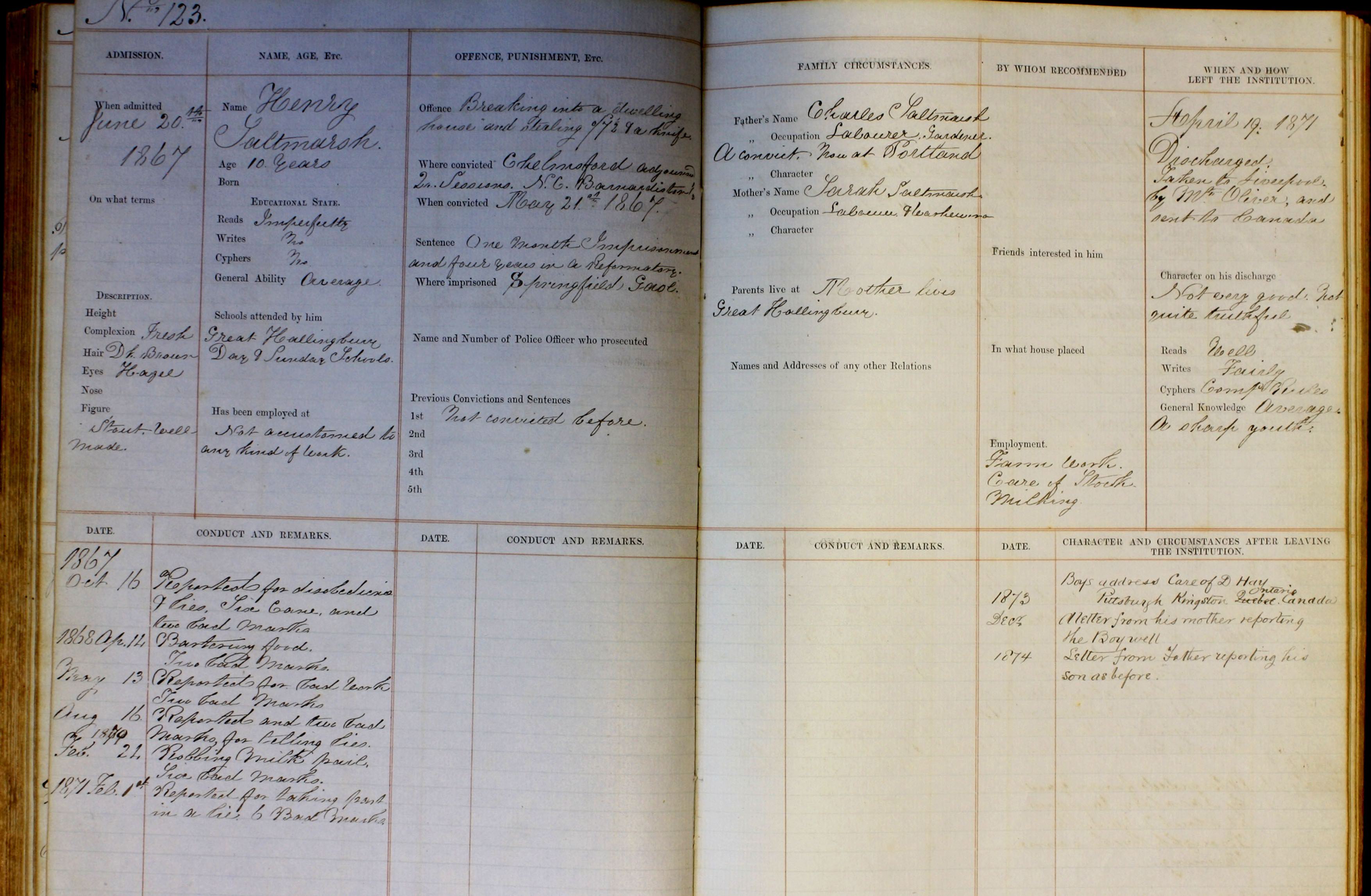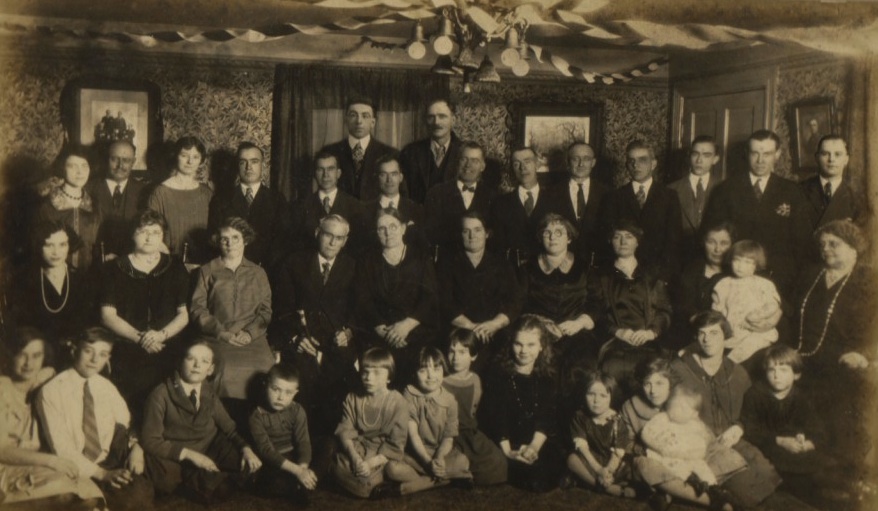Henry Saltmarsh’s Origins
My great-grandfather Henry Saltmarsh was born August 17, 1855 in Bishop’s Stortford, Hertfordshire, when his mother, Sarah Thurley was a temporary resident of the Bishop’s Stortford Union workhouse and shortly before his father, Charles Saltmarsh, a servant and agricultural laborer, was convicted for the second time of larceny and receiving stolen goods. Henry was the sixth of nine children born to Charles and Sarah (Thurley) Saltmarsh, who lived in Great Hallingbury, Essex. Henry’s Saltmarsh and Thurley ancestors have deep roots in Great Hallingbury and Hatfield Broad Oak, Essex, England, to this day, a rural area east of London. Henry’s grandfather, William Saltmarsh, former groom to the rector at St Giles church in Great Hallingbury, worked as the coachman for the Archer-Houblon family in nearby Theydon Garnon from the 1840s through the early 1860s, leaving his wife Mary Ann to raise their children on her own. Henry’s father Charles Saltmarsh had four convictions for theft, serving four separate terms in different prisons, often leaving his wife to manage the family. Nevertheless, Charles always seemed to have been granted early release, and the family reunited, despite difficult times.
Henry Saltmarsh’s Journey
On May 14, 1867, Henry Saltmarsh, age 11, was arrested along with his older brother George for breaking and entering a dwelling house in Great Hallingbury and stealing 7 1/2d and a knife. On May 21, 1867, both boys were sentenced to one month’s imprisonment in Springfield gaol and four years in a reformatory. At the time, their father Charles was serving a 7-year term at Portland prison in Dorset, for a third larceny conviction, having stolen “five live fowl.”
Henry’s record from the Hertfordshire Reformatory provides details about his “conduct:” caned for “disobedience and lies;” received “bad marks” for “robbing the milk pail” and “bartering food;” employment: “farm work, care of stock, milking;” his character on discharge: “not very good; not quite truthful (…).” And yet, he was deemed “a sharp youth.” His circumstances after leaving the institution: “discharged April 19, 1871, taken to Liverpool by Mr. Oliver and sent to Canada.”
As the Library and Archives Canada Home Children database indicates, 15-year-old Henry sailed from Liverpool on April 20, 1871, on the SS Moravian with two other boys from the reformatory and arrived at Québec on May 2, 1871. The reformatory record shows that according to further correspondence with his parents in Great Hallingbury, he was sent to work for D. Hay, a farmer (possibly Donald Hay, an immigrant from Inverness, Scotland), in Pittsburgh Township, Kingston, Ontario, at least until 1874.
There is no way of knowing how Henry Saltmarsh was treated on D. Hay’s farm, but by 1876, Henry had made his way to Hamilton, Ontario where, on December 25 the same year, he married Margaret Wilds, born 1858 in North Cayuga Township, Haldimand County. After his marriage, he began using the name Harry Marshall. Although he always used the surname Marshall on Canadian Census records, he sometimes used Saltmarsh, and sometimes Marshall when registering the births of the nine children he had with Margaret Wilds between 1878 and 1896.
Henry Saltmarsh, now Harry Marshall, as found in various city directories, the Hamilton Spectator and Censuses, worked as a landscape gardener, a florist and a market produce dealer at the Hamilton farmers’ market. By 1911, he was superintendent of the Hamilton parks board, and lived with his family at Battery Lodge on the grounds of Dundurn Castle. He died there on December 27, 1925. One of his sons, Frederick Marshall, later served as superintendent of Hamilton parks. Another son, my grandfather, Charles William Marshall, was superintendent of horticulture in Gage Park, Hamilton until the early 1960s.
Finding a Thread in Family Tales
According to family legend, Henry Saltmarsh changed his name from Saltmarsh to Marshall because he had committed a serious, possibly violent crime in England. He was said to be very strict and he liberally used corporal punishment on his sons. No doubt he had been shaped by cruel circumstances, but his rural, agricultural background also shaped him, and he seems to have made the best of bad circumstances. One thread that comes to mind is paternal absence: the absent father Charles, repeatedly convicted for theft, and the absent grandfather William, always on the road as a coachman. Not hard to understand why young Henry bartered food or was deemed “not very truthful” in the reformatory. What I like to remember is the memorial to Fred Marshall, son of Harry, in Gage Park, Hamilton, which is inscribed: “he created beauty.”
Postscript
My mother was very moved and relieved to discover the true story of her intimidating grandfather. Harry Marshall and Margaret Wilds had 9 children, 22 grandchildren and 28 great-grandchildren (by 1944).
Acknowledgements: Sincere thanks to people who helped me uncover Henry’s story: people on the Hamilton Wentworth and BHC rootsweb mailing lists, particularly Marj Kohli and Gail Collins.
In memory of my mother, Bernice Isabella Perkes, née Marshall (1923-2013).
~Carolyn Perkes


